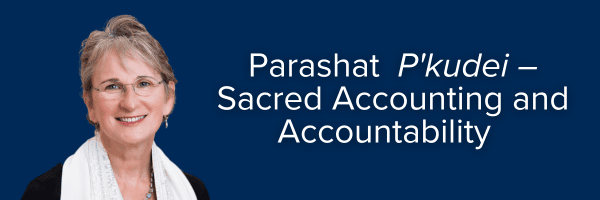P’kudei is the last Torah portion in the book of Exodus. It speaks about the accounting system for the tabernacle, the Israelites sacred space they carried and used during the time that they wandered in the desert. It is full of details and figures, descriptions and prescriptions. At first glance it appears to be the information you would put in a ledger of purchases, money in and money out etc. But in the context of our Torah, with its main purpose of offering us ethical guidance in our daily lives, this portion is more accurately about accountability and transparency. The commentators, many ancient and modern scholars, use this portion to caution us about the importance of the morality of those in public office. They speak about the responsibility of leaders to manage funds appropriately. In light of all that is happening in our government right now, I thought it would be important to read more of these rabbis’ advice.
My colleague, Rabbi Deborah Prinz, summaries their thoughts:
P’kudei begins, “These are the records (p’kudei) of the Tabernacle of the Pact, which were drawn up at Moses’ bidding.” The rabbis ask – Why does Moses himself provide a full accounting of the materials entrusted to him for the construction project? One would think that Moses, of all people, was trusted absolutely by the people. According to some rabbinic views, Moses’ accounting report was his direct response to accusations that he had improperly managed public funds. Indeed, several rabbinic texts state that the sources of Moses’ wealth, as well as his weight, were sharply criticized by others: “They looked at his back and said one to another, ‘What a neck! What legs! Look at Moses’ thighs; how thick they are! Of course, he eats and drinks from what he takes from us.’ Another says: ‘Fool! A man who oversees the work of the Tabernacle – talents of silver, talents of gold, uncounted, unweighted, and unnumbered – what do you expect-that he should not be rich?’” When Moses heard this, he said, ‘As soon as the work of the Tabernacle is finished, I shall render them an account.’ And as soon as it was finished, he said to them: ‘These are the accounts of the Tabernacle.'” (Jerusalem Talmud, Bikurim, chapter 3, Halachah 3; Tanchuma, P’kudei 7; Midrash Rabbah 51:6) Thus Moses accounted for the materials that were used in order to set the record straight and secure his own honor.
But other commentators suggest that Moses anticipated accusations of misuse of funds, taking upon himself a process of accountability in order to preempt the suspicions of others. Isaac Spinka, a Chasidic rabbi (1875-1944), maintained that Moses was only reporting proudly that all the work had been carefully completed. The Chatam Sofer (1762-1839) taught that Moses intended to set an example for later leaders of the importance of remaining above suspicion.
The words of P’kudei, then, remind us that leaders earn trust through their anticipation of the needs of the people, fiscal responsibility, and caution about even the merest appearance of wrongdoing. As Numbers 32:22 advises, “You shall be clear before God and Israel”; that is, a leader must possess integrity and transparency. The commandments of P’kudei are as relevant to us as they were to our ancestors. Moses is held to a high standard of honesty and accountability, so shall each of us – from the ones who keep the ledgers for the shop, or the Temple, to the ones who balance the budget for the non-profit or the nation.
Shabbat shalom,
Rabbi Amy Schwartzman


